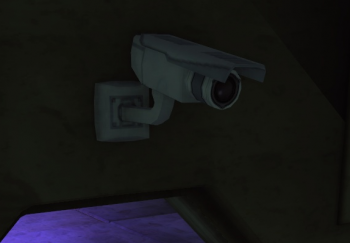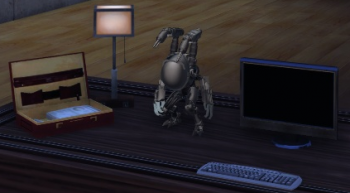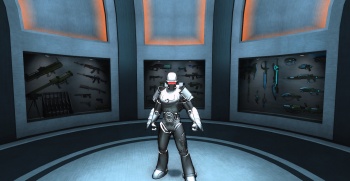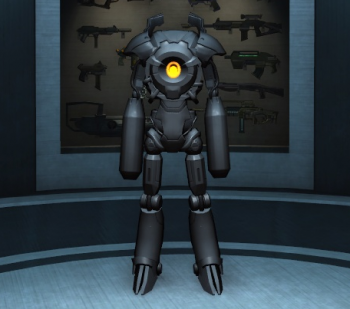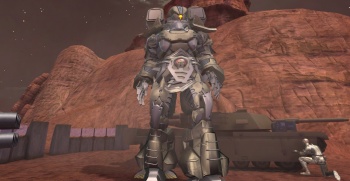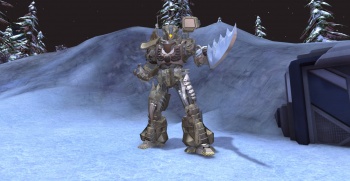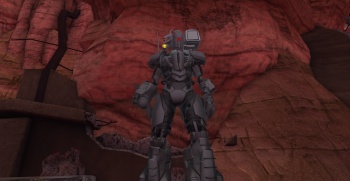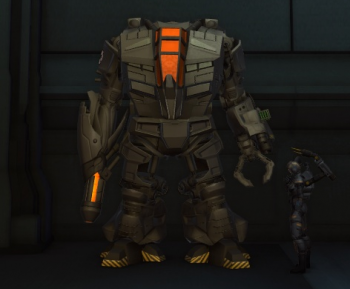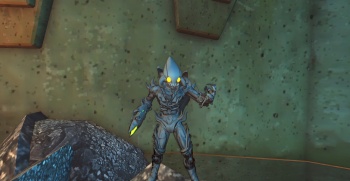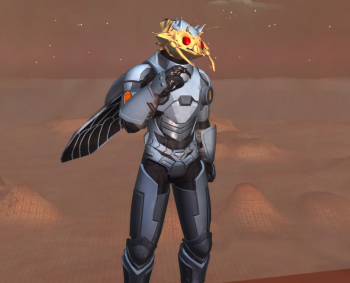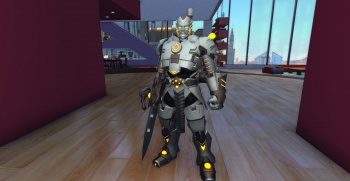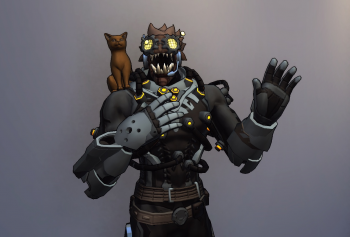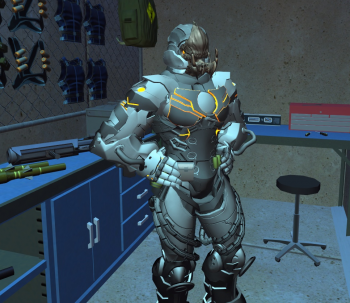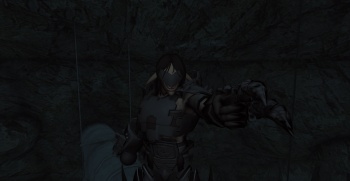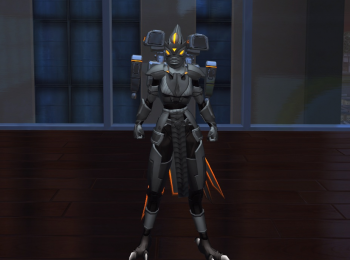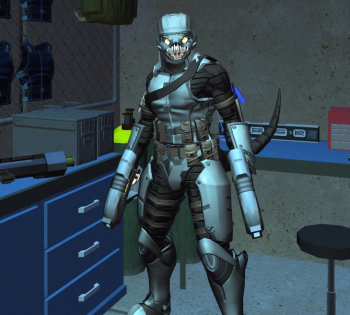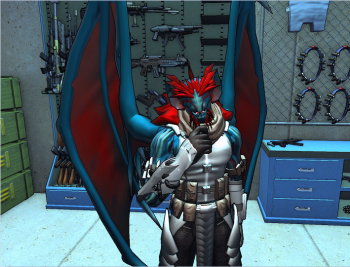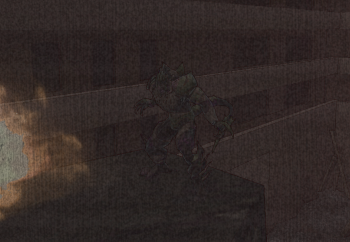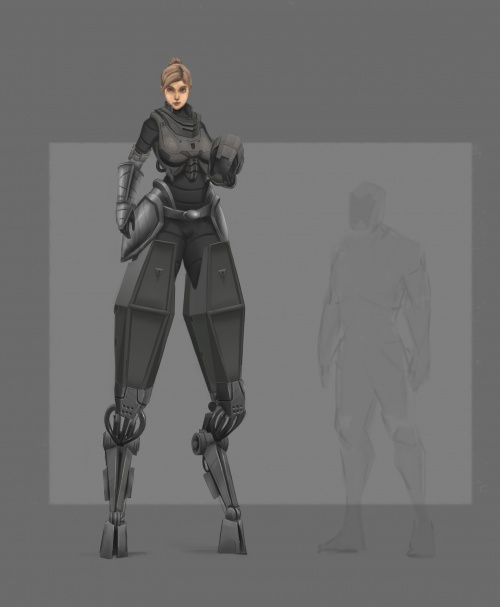Difference between revisions of "Ardacorp"
| (8 intermediate revisions by the same user not shown) | |||
| Line 32: | Line 32: | ||
Ardacorp was founded in 1983 by [[Victor Ardaman]] as a company manufacturing automated security systems for commercial and private properties. | Ardacorp was founded in 1983 by [[Victor Ardaman]] as a company manufacturing automated security systems for commercial and private properties. | ||
| − | True to its roots, Ardacorp continued development of security systems, but | + | True to its roots, Ardacorp continued development of security systems, but steered in the direction of robotic technology. It began with the 'Argus'; small quadruped robots possessing many sensors, making them an effective alternative to stationary cameras. The Argus drones were typically linked to a central mainframe that ran specifically to issue necessary commands to the units, similar to a hive mind concept. It wasn't long after the introduction of these drones that Ardaman came to a realisation: if he developed machines that could sufficiently replace soldiers in armed conflicts, he could both save lives and open up a whole new window of opportunity to his company. Gaining the attention of the military was his next goal. |
='''''<div style="color:black; background-color: grey"><u>Automated Units</u></div>'''''= | ='''''<div style="color:black; background-color: grey"><u>Automated Units</u></div>'''''= | ||
| − | [[File:Argus Mk.6.png|350px|thumb|center|'''The Argus | + | [[File:Argus Mk.6.png|350px|thumb|center|'''The Argus''']] |
The first truly autonomous robotic unit developed by the company, produced as early as 1992, Argus drones are designed as mobile spy platforms; small and highly agile, the unit is able to quickly traverse terrain and climb up sheer surfaces with specialised claws, allowing it to access areas that would otherwise prove difficult for humans to reach. Each Drone possesses an opaque dome at the front housing a sophisticated sensor array for perceiving light, sound, temperature, and even airborne chemicals. If necessary, Argus drones can be converted into mobile bombs by replacing most of their expensive sensor equipment with an explosive charge, and are identified by a coat of vibrant red paint over the frontal dome. Over the years, the design has gone through a number of revisions and still sees active use to this day. | The first truly autonomous robotic unit developed by the company, produced as early as 1992, Argus drones are designed as mobile spy platforms; small and highly agile, the unit is able to quickly traverse terrain and climb up sheer surfaces with specialised claws, allowing it to access areas that would otherwise prove difficult for humans to reach. Each Drone possesses an opaque dome at the front housing a sophisticated sensor array for perceiving light, sound, temperature, and even airborne chemicals. If necessary, Argus drones can be converted into mobile bombs by replacing most of their expensive sensor equipment with an explosive charge, and are identified by a coat of vibrant red paint over the frontal dome. Over the years, the design has gone through a number of revisions and still sees active use to this day. | ||
| − | [[image:Screenshot 2015-06-18-20-00-58.jpg|350px|thumb|center|'''The | + | [[image:Screenshot 2015-06-18-20-00-58.jpg|350px|thumb|center|'''The ICD''']] |
Ardacorp's first automated infantry unit made its debut in 1995, designated the "ACRP-ICD-001", an acronym for "Intelligent Combat Drone"; it had a basic AI, controlled by a non-localised central mainframe. The ICD ran with the concept of "quantity over quality" and were built with fairly inexpensive materials, but their programming often led to confusion in combat. Despite its cost efficiency, the unit did not perform to the high standard required, and replacing trained soldiers with them was a laughable notion. The ICD series ended with the Mk.4, which was too expensive to mass-produce. '''The ICD series was superseded by the Cyclops on the 10th of June, 2002.''' | Ardacorp's first automated infantry unit made its debut in 1995, designated the "ACRP-ICD-001", an acronym for "Intelligent Combat Drone"; it had a basic AI, controlled by a non-localised central mainframe. The ICD ran with the concept of "quantity over quality" and were built with fairly inexpensive materials, but their programming often led to confusion in combat. Despite its cost efficiency, the unit did not perform to the high standard required, and replacing trained soldiers with them was a laughable notion. The ICD series ended with the Mk.4, which was too expensive to mass-produce. '''The ICD series was superseded by the Cyclops on the 10th of June, 2002.''' | ||
| − | [[File:Cyclops Mk.4.png|350px|thumb|center|'''The Cyclops | + | [[File:Cyclops Mk.4.png|350px|thumb|center|'''The Cyclops''']] |
| − | Since the closure of the ICD series, Ardacorp had moved forward in the field of robotics with the introduction of the Cyclops. | + | Since the closure of the ICD series, Ardacorp had moved forward in the field of robotics with the introduction of the Cyclops. A roaring success in action, it outclassed the ICD series in combat and proved cheaper to produce than the notoriously expensive ICD Mk.4. In the spirit of cost efficiency and simplicity, the Cyclops was designed without a head, its camera and sensors housed within the torso. A pair of integrated arm weapons were chosen instead of hands, sacrificing loadout flexibility for operational security. The purposefully non-ergonomic weaponry powered by the unit's internal battery makes it virtually impossible for enemy combatants to seize and utilise the armament without significant modification. |
| Line 57: | Line 57: | ||
| − | [[image:Screenshot 2015-06-18-20-17-55.jpg|350px|thumb|center|''' | + | [[image:Screenshot 2015-06-18-20-17-55.jpg|350px|thumb|center|'''The original Comet unit, deployed in the Nevada desert''']] |
| − | So, in 2006, the company gave birth to the Comet. It was a towering, mechanized powerhouse, featuring a number of inbuilt weapon systems that granted it | + | So, in 2006, the company gave birth to the Comet. It was a towering, mechanized powerhouse, featuring a number of inbuilt weapon systems that granted it ridiculous firepower. An armoured hatch on the front of its torso allowed entry to the pilot's seat, and cameras mounted to its head and arms were used instead of a conventional windshield or viewscreen; this gave the driver increased levels of protection, which made the Comet a favourable choice amongst Ardacorp's larger and wealthier clientele. Over three-hundred are estimated to have been built. '''The Comet was replaced by the upgraded Mk.2 on the 3rd of January, 2008''' |
| − | [[image:Screenshot 2015-06-18-20-22-35.jpg|350px|thumb|center|'''A | + | [[image:Screenshot 2015-06-18-20-22-35.jpg|350px|thumb|center|'''A Comet unit, illegally obtained and modified by armed insurgents''']] |
In fact, the Comet was '''so''' popular that older units started to appear on the black market. Company forces were dispatched to Alaska in order to eliminate a modified Comet unit within the hands of armed Russian insurgents reported to the north of Wainwright. Some of the unit's armour had been replaced with custom-built plates, a missile pod was missing, and its left arm had been retrofitted with a reinforced steel blade; it was assumed that if the modified Comet were left unopposed, the insurgents would've completely re-armoured it, and possibly added additional weaponry. | In fact, the Comet was '''so''' popular that older units started to appear on the black market. Company forces were dispatched to Alaska in order to eliminate a modified Comet unit within the hands of armed Russian insurgents reported to the north of Wainwright. Some of the unit's armour had been replaced with custom-built plates, a missile pod was missing, and its left arm had been retrofitted with a reinforced steel blade; it was assumed that if the modified Comet were left unopposed, the insurgents would've completely re-armoured it, and possibly added additional weaponry. | ||
| Line 72: | Line 72: | ||
| − | [[File:Amarok Mk.4.png|350px|thumb|center|'''The Amarok | + | [[File:Amarok Mk.4.png|350px|thumb|center|'''The Amarok''']] |
| − | The Amarok is Ardacorp's latest development in bipedal vehicular technology. The machine has gone through many revisions over the years with a myriad of module upgrades and shifts in design philosophy. Originally, the design was conceived as a way of cutting production costs - much like the Cyclops series - but the consideration of immense firepower within a small package also brought its own allure. Of course, the Amarok is far from small, but compared to other competing designs and Ardacorp's own older models its profile could be described as compact and stocky. The standard | + | The Amarok is Ardacorp's latest development in bipedal vehicular technology. The machine has gone through many revisions over the years with a myriad of module upgrades and shifts in design philosophy. Originally, the design was conceived as a way of cutting production costs - much like the Cyclops series - but the consideration of immense firepower within a small package also brought its own allure. Of course, the Amarok is far from small, but compared to other competing designs and Ardacorp's own older models its profile could be described as compact and stocky. The standard setup comes installed with a formidable particle cannon mounted to its right arm, whilst its left arm sports a combined system of grenade launcher, flamethrower, and grasping claw. |
| − | ='''''<div style="color:black; background-color: grey"><u>The | + | ='''''<div style="color:black; background-color: grey"><u>The ABRA absorption</u></div>'''''= |
Shortly after the Cyclops first saw service in 2002, Ardaman had considered an alternative to robotics that would almost eliminate material expenditure. Biological soldiers. The aim was to make them non-sentient and driven by instinct, yet subservient and receptive to commands. They wouldn't require training or equipment, as everything would be grown 'naturally', equalling more profit for Victor's company. | Shortly after the Cyclops first saw service in 2002, Ardaman had considered an alternative to robotics that would almost eliminate material expenditure. Biological soldiers. The aim was to make them non-sentient and driven by instinct, yet subservient and receptive to commands. They wouldn't require training or equipment, as everything would be grown 'naturally', equalling more profit for Victor's company. | ||
| − | However, it wasn't Ardacorp that pursued this goal single-handedly. The company had no previous experience and didn't have the resources, staff, or facilities to even begin work in this field. Ardaman instead approached a string of stem cell research labs, known collectively as ' | + | However, it wasn't Ardacorp that pursued this goal single-handedly. The company had no previous experience and didn't have the resources, staff, or facilities to even begin work in this field. Ardaman instead approached a string of stem cell research labs, known collectively as 'ABRA' (American Biological Research Agency), buying out their sites and scientists to fulfil his wishes. |
After five years of intense trial and error of experimental gene templates, Ardacorp finally managed to develop the "Crusader". The creature had a standing height of around 7ft, but adopted a hunched and bestial posture that often deceived viewers of its true size. A remarkable trait of these monstrosities was the inclusion of an arm that functioned as a bio-weapon, which produced a highly corrosive and sticky gel substance that could be squirted at victims via muscle spasms. They took just two months to fully mature, and many were grown. Unfortunately, the first few batches created defective specimens that suffered from strange physical deformities, hindering healthy growth and mental development. Eventually, however, the project was deemed successful and Ardaman pushed for the concept to be discussed with the military. | After five years of intense trial and error of experimental gene templates, Ardacorp finally managed to develop the "Crusader". The creature had a standing height of around 7ft, but adopted a hunched and bestial posture that often deceived viewers of its true size. A remarkable trait of these monstrosities was the inclusion of an arm that functioned as a bio-weapon, which produced a highly corrosive and sticky gel substance that could be squirted at victims via muscle spasms. They took just two months to fully mature, and many were grown. Unfortunately, the first few batches created defective specimens that suffered from strange physical deformities, hindering healthy growth and mental development. Eventually, however, the project was deemed successful and Ardaman pushed for the concept to be discussed with the military. | ||
| Line 149: | Line 149: | ||
Ardaman took the outcome of the USAF meeting poorly. Considering the disapproval of the Army, and the units having no other use aside from being terror weapons, the CEO ordered a mass burning of the creatures, which he felt was a cruel but necessary solution to this new problem. So, on the 12th of March 2008, Ardacorp staff gathered the Crusaders into large containers outside, not far from the company's Denver branch, torching the masses of monstrous products. | Ardaman took the outcome of the USAF meeting poorly. Considering the disapproval of the Army, and the units having no other use aside from being terror weapons, the CEO ordered a mass burning of the creatures, which he felt was a cruel but necessary solution to this new problem. So, on the 12th of March 2008, Ardacorp staff gathered the Crusaders into large containers outside, not far from the company's Denver branch, torching the masses of monstrous products. | ||
| − | On that day, some residents of Denver claimed to hear horrid shrieking | + | On that day, some residents of Denver claimed to hear horrid shrieking accompanied by a scent of barbeque. |
='''''<div style="color:black; background-color: grey"><u>Playing God</u></div>'''''= | ='''''<div style="color:black; background-color: grey"><u>Playing God</u></div>'''''= | ||
| − | By 2008, | + | By 2008, ABRA had gained much experience from the Crusader project. However, because of Ardaman's failed pitch, the company had to shift its focus. Instead of creating organisms from scratch, they began to integrate alternative DNA into embryos, attempting to find the perfect recipe. Some of the scientists had already experimented with Qularr subjects in the past - so a small clutch of their frozen eggs, preserved since 1966, were used to create four successful products that incorporated Qularr and Human DNA. Each subject was given a different "meta gene": gyrokinesis, electrokinesis, cryokinesis, and pryokinesis. |
The successful experiments were suspended inside tubes filled with nutrients to hasten the process. By year's end they all achieved biological adulthood. Artificial memories were implanted into their brains, allowing the subjects to understand the world around them. Unfortunately, the electrokinetic embryo had developed incorrectly and was missing both of its arms - a problem remedied through cybernetic augmentation. | The successful experiments were suspended inside tubes filled with nutrients to hasten the process. By year's end they all achieved biological adulthood. Artificial memories were implanted into their brains, allowing the subjects to understand the world around them. Unfortunately, the electrokinetic embryo had developed incorrectly and was missing both of its arms - a problem remedied through cybernetic augmentation. | ||
| Line 163: | Line 163: | ||
='''''<div style="color:black; background-color: grey"><u>The Monster Squad</u></div>'''''= | ='''''<div style="color:black; background-color: grey"><u>The Monster Squad</u></div>'''''= | ||
| − | The Monster Squad is an elite fighting unit formed upon CEO Victor Ardaman's request after a formal meeting with his team of biologists – | + | The Monster Squad is an elite fighting unit formed upon CEO Victor Ardaman's request after a formal meeting with his team of biologists – ABRA scientists, formerly devoted to the practice of stem cell research. The Crusader project was a resounding success, despite the military's response, but it wasn't quite the result they needed. Ardacorp required something more intelligent, and The Monster Squad was the answer. |
The squad was to be composed only of the most successful products – the wheat among the chaff. Many experiments came out as malformed fetuses or, more commonly, lumps of basic living matter with no real use – but those chosen for the Squad were marvels of the (un)natural world, sporting intellect, strength, or agility that far and away surpassed the Crusaders before them. It was no longer about building an army, but about assembling a compact force that could topple one. | The squad was to be composed only of the most successful products – the wheat among the chaff. Many experiments came out as malformed fetuses or, more commonly, lumps of basic living matter with no real use – but those chosen for the Squad were marvels of the (un)natural world, sporting intellect, strength, or agility that far and away surpassed the Crusaders before them. It was no longer about building an army, but about assembling a compact force that could topple one. | ||
| Line 180: | Line 180: | ||
[[File:Subject-N19.png|350px|thumb|center|'''Subject-N18 as seen in full armour'''<br>(Character made by @berfegor)]] | [[File:Subject-N19.png|350px|thumb|center|'''Subject-N18 as seen in full armour'''<br>(Character made by @berfegor)]] | ||
| − | '''Subject-N18''' was grown using various feline genes along with human DNA. Codenamed 'Hackman', this sly creature was exemplary because of his affinity for computer systems - an unexpected trait that became apparent after a particular incident; nonetheless, this perk proved valuable in practice. Capable of an astonishingly fast sprint speed, N18 was known for crossing long distances in a short amount of time; this, in combination with his lean and nimble body, made him | + | '''Subject-N18''' was grown using various feline genes along with human DNA. Codenamed 'Hackman', this sly creature was exemplary because of his affinity for computer systems - an unexpected trait that became apparent after a particular incident; nonetheless, this perk proved valuable in practice. Capable of an astonishingly fast sprint speed, N18 was known for crossing long distances in a short amount of time; this, in combination with his lean and nimble body, made him effective at scouting for enemy positions and keeping the opposition on their toes when infiltration was no longer an option. N18's hacking skills came in handy if a less 'hands-on' approach was necessary, disabling security systems or accessing hidden digital information when the need arose. However, his strange fascination for cats often led to complications during operations, and he was deemed a liability. '''Subject-N18 was disposed of on April 16th, 2013.''' |
| Line 218: | Line 218: | ||
| − | ===<div style="color:black; background-color: grey"><u> | + | ===<div style="color:black; background-color: grey"><u>American Biological Research Agency</u></div>=== |
| − | Formerly a collective of independent stem cell research labs, | + | Formerly a collective of independent stem cell research labs, ABRA was absorbed by Ardacorp in early 2003 and now functions as its biological technologies developer. On the surface, this company researches new medical treatments and technology, offering compensation to meta-humans for partaking in analysis and sampling of their genes for use in medical science. Under the surface, ABRA also gives people the opportunity to acquire superpowers through various gene therapy techniques in exchange for money. ABRA is responsible for unethical human experimentation and the production of the Monster Squad, Ardacorp's wetwork team. |
Latest revision as of 01:25, 6 May 2024
|
The following in-universe content has been declared by the author to be locked information that is either classified or yet to be revealed to other characters. Do not attempt to use this information in-universe. The author requires you to ask for consent before using any of the content below. |
|
The author of this article has marked this as a creative work, and would prefer that other users not edit it. Please respect this, and unless repairing a typo, spelling, or other minor technical error, think of this page as read-only. |
Do you own a business or an institution that needs protection? Are you responsible for the safe keeping of financial assets, government property, or sensitive materials? Then your solution is clear: Ardacorp. Originally a CCTV developer, we have been involved in the business of security since our foundation in 1983. Alarm systems, weaponised cameras, infrared laser tripwires, electroplate floor conversion, and optical camouflage sensors are just a few of the services we offer for one-time payments.
If you'd prefer something less static, or perhaps want to bolster your existing security solutions, we also offer self-guiding drones and server installation for monthly fees; but if none of that takes your fancy, we can always throw a well-trained agent your way for varying monthly costs. Seen anything you like yet?
If the answer is yes, then head over to our website at www.ardacorp.com to browse our product line. Alternatively, you may give us a call on 0196219830 to speak to a non-automated advisor (call costs vary with provider).
Do not delay – your security depends on it.
Contents
[hide]Overview
Ardacorp was founded in 1983 by Victor Ardaman as a company manufacturing automated security systems for commercial and private properties.
True to its roots, Ardacorp continued development of security systems, but steered in the direction of robotic technology. It began with the 'Argus'; small quadruped robots possessing many sensors, making them an effective alternative to stationary cameras. The Argus drones were typically linked to a central mainframe that ran specifically to issue necessary commands to the units, similar to a hive mind concept. It wasn't long after the introduction of these drones that Ardaman came to a realisation: if he developed machines that could sufficiently replace soldiers in armed conflicts, he could both save lives and open up a whole new window of opportunity to his company. Gaining the attention of the military was his next goal.
Automated Units
The first truly autonomous robotic unit developed by the company, produced as early as 1992, Argus drones are designed as mobile spy platforms; small and highly agile, the unit is able to quickly traverse terrain and climb up sheer surfaces with specialised claws, allowing it to access areas that would otherwise prove difficult for humans to reach. Each Drone possesses an opaque dome at the front housing a sophisticated sensor array for perceiving light, sound, temperature, and even airborne chemicals. If necessary, Argus drones can be converted into mobile bombs by replacing most of their expensive sensor equipment with an explosive charge, and are identified by a coat of vibrant red paint over the frontal dome. Over the years, the design has gone through a number of revisions and still sees active use to this day.
Ardacorp's first automated infantry unit made its debut in 1995, designated the "ACRP-ICD-001", an acronym for "Intelligent Combat Drone"; it had a basic AI, controlled by a non-localised central mainframe. The ICD ran with the concept of "quantity over quality" and were built with fairly inexpensive materials, but their programming often led to confusion in combat. Despite its cost efficiency, the unit did not perform to the high standard required, and replacing trained soldiers with them was a laughable notion. The ICD series ended with the Mk.4, which was too expensive to mass-produce. The ICD series was superseded by the Cyclops on the 10th of June, 2002.
Since the closure of the ICD series, Ardacorp had moved forward in the field of robotics with the introduction of the Cyclops. A roaring success in action, it outclassed the ICD series in combat and proved cheaper to produce than the notoriously expensive ICD Mk.4. In the spirit of cost efficiency and simplicity, the Cyclops was designed without a head, its camera and sensors housed within the torso. A pair of integrated arm weapons were chosen instead of hands, sacrificing loadout flexibility for operational security. The purposefully non-ergonomic weaponry powered by the unit's internal battery makes it virtually impossible for enemy combatants to seize and utilise the armament without significant modification.
Manually Operated Units
Ardaman's ambition to crack open the military market lured him to the possibility of manufacturing larger and heavier machines, which also required human pilots to supervise and operate their high levels of firepower.
So, in 2006, the company gave birth to the Comet. It was a towering, mechanized powerhouse, featuring a number of inbuilt weapon systems that granted it ridiculous firepower. An armoured hatch on the front of its torso allowed entry to the pilot's seat, and cameras mounted to its head and arms were used instead of a conventional windshield or viewscreen; this gave the driver increased levels of protection, which made the Comet a favourable choice amongst Ardacorp's larger and wealthier clientele. Over three-hundred are estimated to have been built. The Comet was replaced by the upgraded Mk.2 on the 3rd of January, 2008
In fact, the Comet was so popular that older units started to appear on the black market. Company forces were dispatched to Alaska in order to eliminate a modified Comet unit within the hands of armed Russian insurgents reported to the north of Wainwright. Some of the unit's armour had been replaced with custom-built plates, a missile pod was missing, and its left arm had been retrofitted with a reinforced steel blade; it was assumed that if the modified Comet were left unopposed, the insurgents would've completely re-armoured it, and possibly added additional weaponry.
After two years of service, the Mk.1's successor emerged. Some parts from the original were used on the Mk.2, but its visual design was totally different. It had a lower overall weight, making it more mobile, but it lacked the same firepower as its predecessor. Its right arm mounted a 105mm cannon, along with a coaxial 20mm auto-gun. Its left arm was built for close engagements, boasting Ardacorp's first energy efficient laser blade, which could concentrate enough heat to slice through most conventional armour plating. The Mk.2 discarded one of the original's missile pods in favour of additional communications equipment and spotlight. The Comet Mk.2 was superseded by the Amarok on the 11th of July, 2012
The Amarok is Ardacorp's latest development in bipedal vehicular technology. The machine has gone through many revisions over the years with a myriad of module upgrades and shifts in design philosophy. Originally, the design was conceived as a way of cutting production costs - much like the Cyclops series - but the consideration of immense firepower within a small package also brought its own allure. Of course, the Amarok is far from small, but compared to other competing designs and Ardacorp's own older models its profile could be described as compact and stocky. The standard setup comes installed with a formidable particle cannon mounted to its right arm, whilst its left arm sports a combined system of grenade launcher, flamethrower, and grasping claw.
The ABRA absorption
Shortly after the Cyclops first saw service in 2002, Ardaman had considered an alternative to robotics that would almost eliminate material expenditure. Biological soldiers. The aim was to make them non-sentient and driven by instinct, yet subservient and receptive to commands. They wouldn't require training or equipment, as everything would be grown 'naturally', equalling more profit for Victor's company.
However, it wasn't Ardacorp that pursued this goal single-handedly. The company had no previous experience and didn't have the resources, staff, or facilities to even begin work in this field. Ardaman instead approached a string of stem cell research labs, known collectively as 'ABRA' (American Biological Research Agency), buying out their sites and scientists to fulfil his wishes.
After five years of intense trial and error of experimental gene templates, Ardacorp finally managed to develop the "Crusader". The creature had a standing height of around 7ft, but adopted a hunched and bestial posture that often deceived viewers of its true size. A remarkable trait of these monstrosities was the inclusion of an arm that functioned as a bio-weapon, which produced a highly corrosive and sticky gel substance that could be squirted at victims via muscle spasms. They took just two months to fully mature, and many were grown. Unfortunately, the first few batches created defective specimens that suffered from strange physical deformities, hindering healthy growth and mental development. Eventually, however, the project was deemed successful and Ardaman pushed for the concept to be discussed with the military.
February 23rd 2007, United States Armed Forces audience
The following text is a transcript of a formal meeting with the US Military attended by Victor Ardaman, Ardacorp CEO:
USAF Representative (Rep): “Mister Ardaman, welcome.” Rep rises from a chair placed behind a desk, extending their right arm towards Victor in offering of a handshake.
Victor: “Hello, thank you.” Victor takes Rep's hand and completes the gesture. Rep sits again whilst Victor sits in the chair opposite.
Rep: “So, after your last arrangement with us, things have changed?” Rep leans on the table with both arms, intently awaiting Victor's response.
Victor: “W-Well... not quite. I actually came to ask a question – and discuss it, of course... I've had a... an idea, really.”
Rep: “An idea. I see. Well, please, go ahead.” Rep gestures with a hand for Victor to continue.
Victor: “Putting Ardacorp's robotic infantry aside, I was thinking, say... theoretically... what if a soldier could be grown without any need for training or equipment? Theoretically, of course."
Rep: “Alright... Well, that concept would be good if said 'soldier' could be grown in a reasonable amount of time.” Victor seems incredibly eager to answer.
Victor: “I knew you'd say that, which is why I was-” Victor pauses. “Nevermind. so... Within a reasonable amount of time. How does, say... Two months sound? Theoretically.” Victor leans on the table with his elbows, interlocking his fingers.
Rep: “Your frequent use of 'theoretically' is a little unnecessary. You've already made it clear that it's a concept and not a reality. Right?” Rep tilts his head a little, with Victor cutting in before he can continue.
Victor: “Oh, absolutely! A reality? No. Of course not.” Victor chuckles with a shake of his head. “No, no – it's entirely theoretical.” Victor blinks and visibly freezes, perhaps realising his citing of 'theoretical' once again.
Rep: pauses for a considerable time, observing Victor. “Right... So, you're telling me that you've... 'considered'... growing soldiers for the military. And you say they'd only take two months to mature?”
Victor: “Yes.”
Rep: “So what will these soldiers be like, then?” Rep raises an eyebrow, awaiting a response.
Victor: “I think they're a lot like animals. They'd BE a lot like animals, rather. They would have basic instincts - fear included - because it's rather a necessity for survival, is it not?” Victor grins nervously. “But of course, it would take quite a lot to scare them, say... When a heavy loss is occurring. Anyway... They'd be grown with their own weapon – a biological one that replenishes its own ammunition.”
Rep: seems amused at the thought, shaking his head. “Mister Ardaman, are you aware of the implications?”
Victor: looks bewildered. “What 'implications'? You mean-” Rep cuts in.
Rep: “I mean the fact that, as you said, they're animals. What if we needed to send them into a conflict where civilians are present? They'd be absolutely terrified of these...” he pauses with a smirk, “Okay – they're practically monsters, from what you're suggesting. They'd be terrified of these monsters around them; and the United States Military does not terrorise civilians.” Victor doesn't offer a reply, despite Rep's pausing. Rep continues: “Human soldiers don't rely solely on instinct to carry out a mission. They can reason and communicate – and that's a very good point, actually; how will these things speak?”
Victor: “No – you're right. It's a far-fetched idea.” Victor shakes his head. Rep crosses their arms. “I'd just considered alternative ways of reducing military costs.”
Rep: “And we'd be happy to accept your alternative ways, if they prove to be viable.”
Victor: looks at Rep silently for a while, seemingly deep in thought, eventually nodding. “Thank you for your time. I'm sorry if you feel it's been wasted.” Victor stands up, offering his right hand to Rep for a handshake.
Rep: “Not at all.” Rep stands up and completes the handshake, Victor turning to leave shortly after.
The sound of a door closing can be heard in the background. Rep addresses a colleague through the one-way glass allowing sight into the meeting room:
Rep: chuckles, knowing Victor isn't in earshot. “Was he being completely serious? Growing monsters to replace soldiers. What a joke.”
The meeting ends there.
The mass burning of March 12th
Ardaman took the outcome of the USAF meeting poorly. Considering the disapproval of the Army, and the units having no other use aside from being terror weapons, the CEO ordered a mass burning of the creatures, which he felt was a cruel but necessary solution to this new problem. So, on the 12th of March 2008, Ardacorp staff gathered the Crusaders into large containers outside, not far from the company's Denver branch, torching the masses of monstrous products.
On that day, some residents of Denver claimed to hear horrid shrieking accompanied by a scent of barbeque.
Playing God
By 2008, ABRA had gained much experience from the Crusader project. However, because of Ardaman's failed pitch, the company had to shift its focus. Instead of creating organisms from scratch, they began to integrate alternative DNA into embryos, attempting to find the perfect recipe. Some of the scientists had already experimented with Qularr subjects in the past - so a small clutch of their frozen eggs, preserved since 1966, were used to create four successful products that incorporated Qularr and Human DNA. Each subject was given a different "meta gene": gyrokinesis, electrokinesis, cryokinesis, and pryokinesis.
The successful experiments were suspended inside tubes filled with nutrients to hasten the process. By year's end they all achieved biological adulthood. Artificial memories were implanted into their brains, allowing the subjects to understand the world around them. Unfortunately, the electrokinetic embryo had developed incorrectly and was missing both of its arms - a problem remedied through cybernetic augmentation.
Despite all the work that was put into the creation of these hybrids, a terrible incident involving the Qularr invasion of 2009 led to the escape of the four meta subjects. In a bid to free themselves from the lab, the traumatised creatures used their abilities to wreak havoc within the facility, causing the deaths of several scientists and responding security personnel. This was an incredibly detrimental event for Ardacorp; not only had their facility been heavily damaged and employees killed, but their newest successful subjects, which were intended for transfer into the Monster Squad programme, had also gotten loose.
The Monster Squad
The Monster Squad is an elite fighting unit formed upon CEO Victor Ardaman's request after a formal meeting with his team of biologists – ABRA scientists, formerly devoted to the practice of stem cell research. The Crusader project was a resounding success, despite the military's response, but it wasn't quite the result they needed. Ardacorp required something more intelligent, and The Monster Squad was the answer.
The squad was to be composed only of the most successful products – the wheat among the chaff. Many experiments came out as malformed fetuses or, more commonly, lumps of basic living matter with no real use – but those chosen for the Squad were marvels of the (un)natural world, sporting intellect, strength, or agility that far and away surpassed the Crusaders before them. It was no longer about building an army, but about assembling a compact force that could topple one.
Subject-N04, codenamed 'Dragonfly' and also known as Xintos, was one of the original four intended for transfer into the Monster Squad programme (See "Playing God"); after nine years, the company were able to reclaim him, and have now successfully integrated Xintos into the unit. A headstrong personality mixed with the destructive ability of pyrokinesis, along with his superhuman resilience and flesh possessing non-Newtonian properties, makes Xintos a formidable warrior. He is likely the most dangerous squad member, and his potential for mass devastation is unprecedented; the manipulation of thermal energy allows him to incinerate almost anything in his path, and he has devised many creative ways to utilise his powers throughout his many engagements, such as depriving targets of breathable air through the use of convection currents. Xintos' highest recorded temperature is 8,132c, but he is theoretically capable of achieving more than this; unfortunately, because of an exponential increase in his body's metabolic rate due to higher heat output, he must wear an inhibitor at all times to moderate it; with this inhibitor active, Subject-N04's maximum temperature is capped at around 2,000c, in order to avoid burnout and, eventually, death.
Subject-N13 was born as a severely deformed individual. Known by many as 'Titan', he developed without arms and required extensive cybernetic augmentation – including the need for limited life-sustaining enhancements due to malformed lungs; the result was an amalgamation of crimson flesh and metal, a hulking figure of over seven feet tall, Titan is a force to be reckoned with when it comes to brute strength – and he even has an admirable level of intellect to compliment it, avoiding the typical “all brawn and no brains” stereotype. The subject became a test unit for Ardacorp's 3GEN nanites – tiny, bug-like robots with incredibly basic functions; they were programmed to scuttle along Titan's body, repairing any inflicted damage – even being able to recycle material from the armour that the creature wears into a wide range of weaponry, making N13 a very diverse and adaptable fighter.
Subject-N18 was grown using various feline genes along with human DNA. Codenamed 'Hackman', this sly creature was exemplary because of his affinity for computer systems - an unexpected trait that became apparent after a particular incident; nonetheless, this perk proved valuable in practice. Capable of an astonishingly fast sprint speed, N18 was known for crossing long distances in a short amount of time; this, in combination with his lean and nimble body, made him effective at scouting for enemy positions and keeping the opposition on their toes when infiltration was no longer an option. N18's hacking skills came in handy if a less 'hands-on' approach was necessary, disabling security systems or accessing hidden digital information when the need arose. However, his strange fascination for cats often led to complications during operations, and he was deemed a liability. Subject-N18 was disposed of on April 16th, 2013.
Subject-N24, or 'Caliber', is a blend of rhinoceros and human DNA, gifted with psionic meta genes during his initial formation process. The result was... initially not as successful as the company had hoped. Due to abnormal growth, N24 came out as just a torso and head, but was spared from genetic repurposing when the company realised how quickly his psionic powers were developing. Despite being capable of everything a human could, due to his extraordinary ability to manipulate the world around him using only the power of his mind, N24 was assigned custom-built cybernetic limbs to act in place of the ones he never had; Ardacorp deemed these prosthetics a necessity to reduce the amount of passive mental strain that came with him having to constantly levitate his own body, and lift objects without hands. The end product was a halfway between biological and mechanical, with the potential to crush whole buildings through telekinesis. N24 primarily acts as long-range support for the squad, putting his specialised marksman training to use as a sniper equipped with a heavy DEW or railgun - a terrifying armament in the hands of a soldier, but even scarier when said soldier can detect his targets through walls via telepathy.
Subject-N27, as far as Monster Squad members go, was easily the strangest. Codenamed 'Reaper', he was 'born' without legs and a right arm; but N27 had a heart and willpower strong enough to compensate for his physical setbacks. Like others before him, Reaper was enhanced with cybernetics, being given a set of expensive reverse-jointed mechanical legs, and a right arm limb replacement – effectively an articulated auto-gun; it served no other purpose besides literally shredding the life out of anyone, or anything, unfortunate enough to be on the company's hit list. N27 did, however, have a fully functioning set of organs within his perfectly-formed torso, and his left arm seemed fine; his face, however... His face was something else. The most prominent feature of the creature's mug was easily the large grin he permanently wore, his teeth shown in their full glory within a beaming smile that stretched from ear to ear. But it wasn't a happy one; on the contrary, Reaper was incredibly envious of the more 'perfect' subjects – even Titan, despite his physical abnormalities; Reaper had more, and he hated it. Despite this, he hid his feelings behind a veil of twisted humour, allowing his victims to be the ones to bare his bottled-up emotions – usually resulting in their dismemberment. It was eventually decided that his unpredictable outbursts were too much of an inconvenience. Subject-N27 was disposed of on January 9th, 2015.
Subject-N36, also known as 'Salvo', is a genetic hybrid between a kangaroo and a human. Her powerful legs are capable of jumping over six meters high, and can achieve twice that distance with the assistance of jump jets mounted to her back. A pair of rocket pods built onto her backpack grants Salvo the ability to rain death upon her enemies from her maximum jump height, giving her the potential to wipe out entire squads of infantry, or even a heavily armoured vehicle, within a moment's notice. Shock-absorbing cybernetics were installed in Salvo's legs to soften the landings from her assisted jumps and, like all Squad members, she possesses the expertise to handle a wide range of firearms. N36 can also dispatch threats with practiced fighting techniques, much to the deepest regrets of anyone foolish enough to come close, after they receive a skull-cracking kick to the head.
Subject-N52 claimed the title of 'Hunter', and was grown using an altered genetic template from the older Crusader units, possessing some similar physical features – such as the long, exclusively canine teeth and muscular tail; the main difference is that he looks more... Human. N52 stands at just over seven foot tall, sharing the pinkish complexion of Caucasian skin; but the monstrous head, teeth and tail betray any claim to humanity. Hunter formed perfectly throughout his growth phase, requiring no cybernetic aid to support life; among staff members, it is widely regarded as the perfect soldier, naturally strong and dexterous with sharp senses, and boasting rapid regeneration. Hunter received extensive training for handling various firearms, but primarily makes use of two heavy repeating particle blasters; these experimental energy-based weapons are capable of firing volleys of dangerously hot atoms, with enough force to punch through most lightly armoured vehicles.
Subject-N61, or 'Stalker', is a curious mixture of chiropteran, axolotl, and human DNA - by far the most complex Monster Squad member ever grown. Capable of long-distance and near-silent flight with a pair of leathery wings, N61 is considered one of the most mobile squad members; this, coupled with his chameleon-like skin and highly agile form, makes N61 the stealthiest, too. Specialising in infiltration and blitz tactics, Stalker fulfils the role of a vanguard; when necessary, he is able to use his quick reflexes to outpace his opponents in direct combat through the use of firearms and trained CQC techniques. However, he is also able to secrete a potent neurotoxin through sweat glands, and assail his quarry with venomous quills that grow upon his scaly body. To top it all off, his seemingly toothless maw hides away a set of deadly retractable fangs and a disturbingly long tongue, ideal for pulling in and silencing hapless victims.
Subsidiaries
Despite its beginnings as a singular entity, Ardacorp has since grown into a vast international organisation with its own daughter companies that all support it in some way.
Amarillo Armaments
An arms manufacturing company set up in 1998, based in Texas. Amarillo Armaments owns factories that produce a wide selection of small arms, solid ammunition, and explosive ordnance for military use. The company also has the capability to build military vehicles, although these are typically produced in batches due to a lack of dedicated facilities and overall lower demand.
American Biological Research Agency
Formerly a collective of independent stem cell research labs, ABRA was absorbed by Ardacorp in early 2003 and now functions as its biological technologies developer. On the surface, this company researches new medical treatments and technology, offering compensation to meta-humans for partaking in analysis and sampling of their genes for use in medical science. Under the surface, ABRA also gives people the opportunity to acquire superpowers through various gene therapy techniques in exchange for money. ABRA is responsible for unethical human experimentation and the production of the Monster Squad, Ardacorp's wetwork team.
Erudite Innovations
An energy company set up in 2007 that dabbles in experimental technology to harness power more efficiently. Some of its most notable breakthroughs include high-capacity micro-filament batteries and a low-emission chemical generator. The company often attempts to engineer nuclear fusion reactors in order to achieve a cleaner and safer method of producing colossal amounts of energy, but technological limitations have so far prevented any tangible progress. Erudite Innovations frequently collaborates with Amarillo Armaments to create energy weapons.
Independent Assets
This section is dedicated to other independent companies that Ardacorp considers valuable assets.
Howard & Hicks
An arms manufacturing company founded by Ross Howard and Baxter Hicks in 1952, based in San Diego. Before the foundation of Amarillo Armaments, Ardacorp partnered with Howard & Hicks to create their weaponised cameras and contracted them to supply firearms for the ICD models, since Ardacorp did not possess a license to manufacture weapons at the time.
Bornmueller Courier Services Co.
Bornmueller Courier Services Co. provides secure delivery services with armoured transports and trained personnel. Ardacorp has essentially outsourced all of its delivery jobs to Bornmueller.
Petite Ingénierie
A French engineering firm based in Lyon that specialises in nanotechnology. Ardacorp collaborated with this company in 2012 to create the 3GEN Nanites used by Subject-N13, and then in 2018 for Project Oneiros.
ReadyCheck Security
A security assessment company currently based in Millennium City. ReadyCheck specialises in exposing weaknesses within the protection of other establishments and works alongside them to patch up the holes. Ardacorp offers its security solutions to ReadyCheck's clientele as a partnership program.
Staff Roster
Like all businesses, Ardacorp has many employees that all contribute towards the company in one way or another. This section displays important or notable members of staff.
The CEO
Victor Ardaman
Administrators
Harry Saunders
Engineers
Alexander Suffolk
Katie "Crutches" Winters
Scientists
Maria Hewert
Shelly Lawrence
Adrian Breets
Security Agents
Elizabeth "Regina" Hall
Katia "Rebel" Winnock
Mitchell "Ignition" Cook
Test Pilots
James "Goat" Vitson
David "Ace" Rickley
Mitchell "Ignition" Cook
Adversaries
Some people become targets of the company because of their efforts to disrupt operations, or because they possess alien biology or advanced technology and cannot be persuaded to allow their study. Then there are those who simply don't like Ardacorp and seek to bring them down. Whatever the case, they are considered Ardacorp's adversaries.
An elusive and highly aggressive lifeform designated "Loki" by Ardacorp for its remarkable shapeshifting abilities. Despite multiple attempts to capture the creature, the company knows very little about it, and have seen no success in obtaining a sample of its DNA. Some scientists believe that the strange entity could be of alien origin, but others think that it could be a human creation; an escaped experiment that nobody will admit to. Subject Loki has been encountered in several different forms of varying size and shape, all of which were highly dangerous. It has never been observed actively altering its appearance, suggesting that the creature may be vulnerable whilst doing so. In response to the challenge posed by Loki, Ardacorp funded Project Oneiros, a drone-like nanomachine collective that possesses its own shape-changing qualities. The company has high hopes for Oneiros, but the project is still very much in its infancy and will likely require time to gather valuable data on its target.



